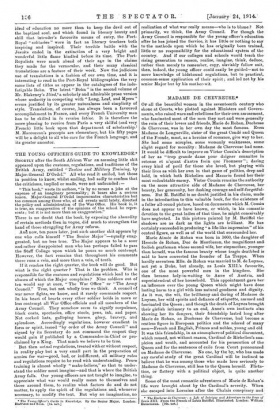THE YOUNG OFFICER'S GUIDE TO KNOWLEDGE.*
SHORTLY after the South African War an amusing little skit appeared upon the customs, regulations, and traditions of the British Army, entitled "Tactics and Military Training, by Major-General D'Orde/." All who read it smiled, but those in position to know, whilst smiling, had sadly to confess that the criticisms, implied or made, were not unfounded:— " This book," wrote its authors, "is by no means a joke at the expense of an imaginary personality; it bears also a serious lesson. Major-General D'Ordel impersonates characteristics but too common among those who, at all events until lately, directed the policy and administration of the War Office. His book is, it is true, an exaggeration of the opinions of the school he repre- sents ; but it is not more than an exaggeration."
There is no doubt that the book, by exposing the absurdity of certain methods then in vogue, did much to strengthen the hand of those struggling for Army reform.
Ana now, ten years later, just suzh another skit appears by one who calls himself "The Senior Major"—equally exag- gerated, but no less true. Tbe Major appears to be a sour and rather disappointed man who has perhaps failed to pass the Staff College upon which he pours so much contempt. However, the fact remains that throughout his comments there runs a vein, and more than a vein, of truth.
If it reaches the right quarter, the book will do good. But what is the right quarter P That is the problem. Who is responsible for the customs and regulations which lead to the abuses of which the Major complains I' Nine soldiers out of ten would say at once, " The War Office" or "The Army Connell." True, but not wholly true we think. A council of war never fights, we know, and it rarely commands respect. In his heart of hearts every other soldier holds in more or less contempt all War Office officials and all members of the Army Council. They somehow seem to signify corpulence, black coats, spectacles, office stools, pens, ink, and paper. Not cocked hats, galloping horses, glory, bravery, and splendour. Accordingly regulations, however excellent in form or spirit, issued "by order of the Army Council" and signed by its Secretary do not command the respect they would gain if published by a Commander-in-Chief or pro- claimed by a King. That much we believe to be true.
' But then actual regulations, treated with or without respect, in reality play but a very small part in the preparation of armies for war—good, bad, or indifferent, all military rules and regulations require to be read with understanding. Peace training is almost wholly "make-believe," so that to under- stand the soldier must imagine—and that is where the British Army fails. Our young officers are not taught to imagine, to appreciate what war would really mean to themselves and those around them, to realize what factors do and do not matter, to apply the spirit of the regulations and, whenever necessary, to modify the text. But why no imagination, no
• The Young Officer'. Guide to Knosstedje. By the Senior Major. London: -Bair:eon and Sono. [Is, net.]
realization of what war really means—who is to blame Not primarily, we think, the Army Council. For though the Army Council is responsible for the young officer's education after he has joined the Service, it has little or nothing to say to the methods upon which lie has originally been trained, little or no responsibility for the educational system of the country. And if our colleges and schools would teach the rising generation to reason, realize, imagine, think, deduce, rather than merely to remember, copy, slavishly follow suit, then, indeed, the young officer could easily be guided—not to mere knowledge of hidebound regulations, but to practical, common-sense application of their spirit; and led not by his senior Major but by his mother-wit.






































 Previous page
Previous page